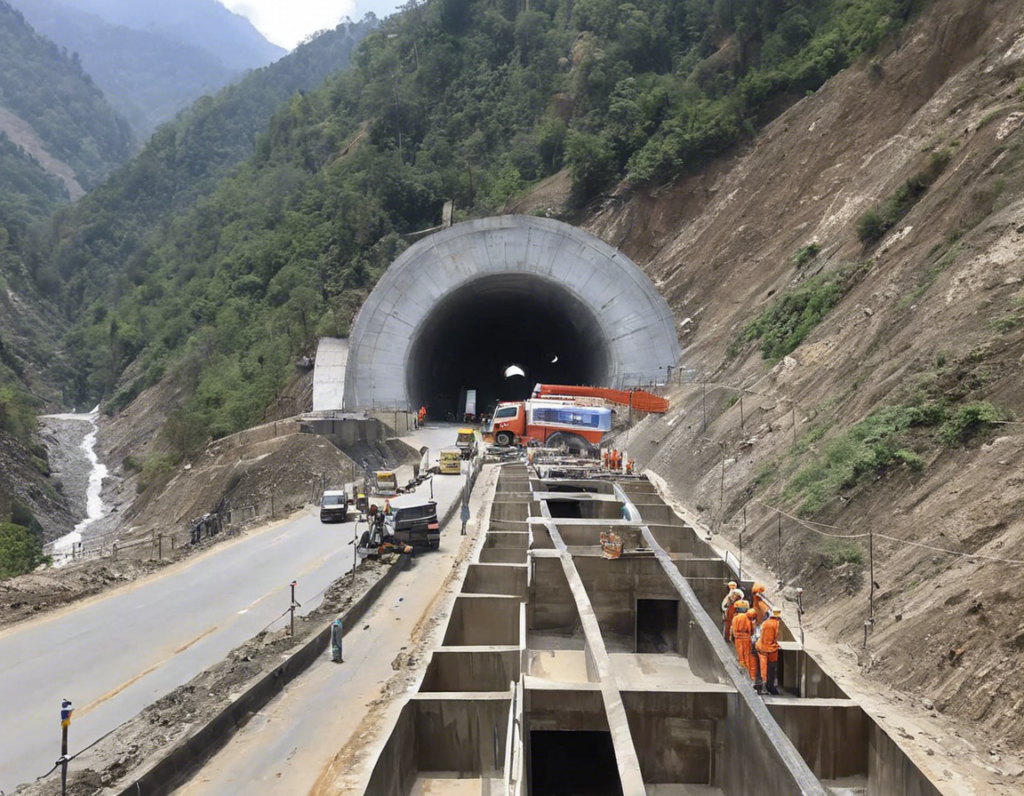Introduction:
The state of Uttarakhand in India is renowned for its scenic beauty, spiritual significance, and adventurous terrain. However, recent events have brought the focus on a different aspect – the numerous tunnels being constructed in the region. These tunnels have the potential to revolutionize connectivity, transportation, and tourism in Uttarakhand. This article delves into the latest news and developments surrounding the construction of tunnels in Uttarakhand, their impact on the region, and what the future holds.
The Growing Network of Tunnels in Uttarakhand:
In recent years, there has been a surge in the construction of tunnels in Uttarakhand as part of infrastructure development initiatives. These tunnels serve multiple purposes, from easing travel to providing strategic connectivity. The Char Dham Highway Project is a significant endeavor that includes the construction of tunnels to improve connectivity to the four sacred Hindu pilgrimage sites of Yamunotri, Gangotri, Kedarnath, and Badrinath. These tunnels aim to reduce travel time and enhance safety for pilgrims and tourists visiting these revered sites.
Impact on Connectivity and Tourism:
The construction of tunnels in Uttarakhand plays a crucial role in enhancing connectivity across the state. By providing all-weather access to remote areas, these tunnels facilitate smoother transportation of goods and people. Improved connectivity not only boosts tourism but also aids in emergency response during natural disasters like landslides and heavy snowfall. Additionally, the tunnels help in promoting sustainable tourism practices by reducing the impact of vehicular traffic on fragile mountain ecosystems.
Challenges Faced in Tunnel Construction:
While the construction of tunnels in Uttarakhand offers various benefits, it also comes with its set of challenges. The rugged terrain, seismic activity, environmental concerns, and the need to ensure minimal disruption to local communities pose significant challenges to tunnel construction projects. Engineers and construction teams have to navigate these obstacles meticulously to ensure the safety and longevity of the tunnels while adhering to environmental regulations.
Technological Advancements in Tunnel Engineering:
To overcome the challenges posed by Uttarakhand’s challenging terrain, tunnel construction projects in the region are leveraging advanced engineering technologies. Techniques such as New Austrian Tunneling Method (NATM), Tunnel Boring Machines (TBMs), and rock bolting are being employed to ensure the stability and durability of the tunnels. These technological advancements not only expedite the construction process but also enhance the safety and efficiency of tunnel infrastructure in Uttarakhand.
Environmental Impact and Sustainability Measures:
The construction of tunnels in Uttarakhand raises concerns about its environmental impact on the fragile Himalayan ecosystem. To address these concerns, sustainability measures are being integrated into tunnel construction projects. Initiatives like afforestation, waste management, and reducing carbon footprint are being implemented to mitigate the environmental footprint of tunnel construction. Additionally, measures are being taken to ensure the free movement of wildlife corridors and to minimize ecological disturbances in the region.
The Future of Tunnel Infrastructure in Uttarakhand:
The development of tunnel infrastructure is set to play a transformative role in Uttarakhand’s progress. As more tunnel projects come to fruition, the state is poised to witness improved connectivity, enhanced disaster resilience, and a boost in tourism and trade. The focus on sustainable tunnel construction practices and technological innovations will shape the future of infrastructure development in Uttarakhand, setting new benchmarks for tunnel engineering in challenging terrains.
Conclusion:
The construction of tunnels in Uttarakhand represents a significant stride towards enhancing connectivity, promoting tourism, and ensuring sustainable development in the region. By navigating through the challenges and leveraging technological advancements, these tunnels are not just engineering marvels but also lifelines that connect Uttarakhand’s diverse landscapes and communities. As Uttarakhand continues to embrace tunnel infrastructure, the state is paving the way for a brighter and more accessible future.
FAQs (Frequently Asked Questions):
-
Are tunnels in Uttarakhand only constructed for transportation purposes?
Tunnels in Uttarakhand serve multiple purposes, including transportation, connectivity enhancement, disaster resilience, and promoting sustainable tourism practices. -
What is the Char Dham Highway Project and how are tunnels related to it?
The Char Dham Highway Project aims to improve connectivity to the four sacred Hindu pilgrimage sites in Uttarakhand. Tunnels are being constructed as part of this project to facilitate smoother and safer travel for pilgrims and tourists. -
How do tunnels in Uttarakhand impact the environment?
The construction of tunnels in Uttarakhand can have environmental implications. To mitigate these impacts, sustainability measures like afforestation, waste management, and wildlife corridor protection are being implemented. -
What technologies are used in tunnel construction in Uttarakhand?
Advanced engineering technologies such as the New Austrian Tunneling Method (NATM), Tunnel Boring Machines (TBMs), and rock bolting are used in tunnel construction projects in Uttarakhand to ensure stability and durability. -
How do tunnels in Uttarakhand enhance disaster resilience?
Tunnels provide all-weather connectivity, which is crucial for effective emergency response during natural disasters like landslides and heavy snowfall, thereby enhancing disaster resilience in the region.
